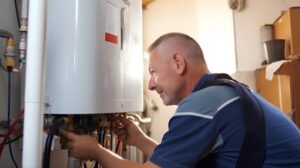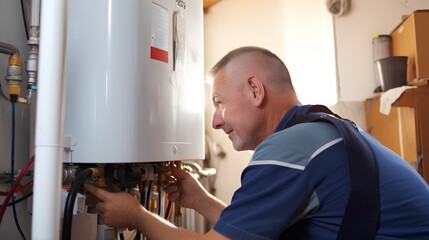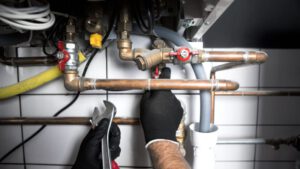Denver Water Heaters are essentials to our everyday lives, from showering and bathing to cleaning dishes and laundry. Our team of experts has years of experience researching, testing, and recommending the best products.
This budget electric heater has two 4,500-watt elements and a self-cleaning dip tube to reduce sediment build-up. It also has LED indicator lights to show a glance if either aspect is heating or not.
Gas water heaters boil and steam water to warm it, storing it in tanks or providing instant hot water for faucets and appliances around the home. They use either natural or propane gas to heat the water and can be found in tank-type or tankless models.
Known for their efficiency, gas water heaters use less energy to operate than electric models. This can help keep your electricity bills lower over time and is especially useful for households with high hot water demands or multiple occupants. They also have a faster recovery rate than electric models, meaning they can heat new water more quickly when the supply runs low.
Another advantage of gas water heaters is that they are safer than electric models. There is a small risk of carbon monoxide poisoning when an electric water heater malfunctions, but there is no danger of this with a gas model. Additionally, there are fewer risks associated with the installation process for a gas model. This is because gas water heaters require a specialized gas line hookup that must be created before the water heater can be installed in your home.
To determine whether a water heater is gas-powered, look at the top of the unit for a 3- or 4-inch pipe. This pipe enters the tank and is used to vent exhaust from the water heater out of your home, making gas models a more eco-friendly choice. If you see this vent pipe, you can be sure that the water heater is gas powered.
Unlike electrical water heaters, gas-powered ones do not need a 220volt power outlet to function. This can save you money on installation costs if your home does not already have a 240volt outlet in the area where you would like the water heater to be placed. The piping for these types of models also is generally easier to install than an electric model, which requires the creation of an entirely new circuit in your home’s electricity system. However, you must be aware that not all homes have a gas line available to them and this could add to the cost of installation.
Electric
Considering about 12 percent of a home’s energy consumption goes toward heating water, it makes sense to choose an electric model that will conserve more energy. But it is important to look at all options before choosing a specific type of electric water heater. Upfront cost is a significant factor, but long-term costs, efficiency ratings, wait times for hot water, and environmental impact can also play a role in the decision making process.
Electric water heaters use electric heating rods positioned vertically inside the tank to heat the water before it is distributed throughout the house. They are smaller than gas models and can fit in closets or other smaller spaces without the need for venting or exhaust systems. They are also generally less expensive to purchase and install than their counterparts.
However, they can only be used if there is a reliable electrical connection, which may not be ideal in areas prone to frequent power outages. Additionally, they take longer than a gas model to heat the water and require more electricity to operate, which can add up over time in the form of higher electricity bills.
While most electric water heaters have an ENERGY STAR® label, the rating system changes each year to reflect new technology and testing procedures. When selecting an electric water heater, look for a model with a UEF (Uniform Energy Factor) of 2.20 or higher.
Gas water heaters have a combustion chamber that creates a flame to heat the water, which requires a source of fuel such as natural gas or propane. The flame is surrounded by an insulated blanket that helps keep the temperature of the water constant and prevents hot spots. Some models have a gas pilot light, which may or may not be on during a power outage, depending on the model and the age of the unit.
While gas is a fossil fuel, it has lower emissions than coal and is cleaner than wind or solar-powered electricity, which is why many homeowners prefer this option. But if you want to minimize your carbon footprint, an electric water heater is the best choice.
Tankless
Unlike conventional tank water heaters, which store large volumes of hot water, tankless units only heat water as it flows through them. This can reduce energy consumption by up to 50% by avoiding standby losses and only heating water when it is needed.
The heat is provided by a gas or electric burner or a metal heat exchanger. Electric models use a heating element to heat the water; gas-powered units have a burner or flame that produces steam that then warms the water. Some of the more sophisticated models have a condensing heat exchanger that maximizes system energy efficiency.
These systems can be installed at point-of-use (POU) for smaller homes or for applications such as laundry or dishwashers, eliminating the need to run a cold water line from the main home water supply. They can also be used in conjunction with solar power to provide a nearly unlimited supply of clean, renewable energy.
In some cases, larger whole-house models are required for households with a lot of simultaneous hot water demand. For these applications, multiple units can be connected in parallel for greater capacity and to minimize the lag time experienced by users.
When the hot water flow sensor senses that there is a demand for hot water, the unit turns on and begins to heat the water. The flow rate is monitored to maintain proper water temperatures and to prevent overheating. These units are available in both electric and gas versions and can be vented or non-vented.
Because a tankless system does not hold water, it is less susceptible to failure or rupture and can be located closer to the point of use. It also occupies less space, taking up only the amount of wall or floor space necessary for its installation. The lack of a storage tank also eliminates the need for “water rules” to determine who can shower and when.
These systems can be quite expensive at the onset–for the unit and the installation–but they pay for themselves over time in energy savings, reducing utility bills and helping to lower carbon emissions. They are also a good choice for those looking to live green and are eligible for rebates through local, state and federal programs.
Installation
Water heaters consume about 20 percent of the energy used in the average home, but they’re often ignored until they start to break. When that happens, it’s a good idea to consult a professional for installation of a new one. This project typically requires a plumbing permit, and it’s not a job for do-it-yourselfers. The list of things that can go wrong with a DIY water heater project is long and includes serious injury, fires, and even carbon monoxide poisoning.
There are several different types of water heaters, and each type offers its own advantages and disadvantages. For example, a tank-style water heater has a large storage tank that holds hot water until needed, while a point-of-use electric water heater heats water as it flows through the pipes. Choosing the right type is important for your home and budget.
The first step in installing a new water heater is to drain the old one. Connect a garden hose to the drain valve at the bottom of the water heater and run it to a floor drain or outdoors. Then, turn off the power supply to the water heater.
After removing the water heater, it’s important to protect the area from any physical damage during the process by putting up a sign that says “WORK AT YOUR OWN RISK.” It’s also recommended that you install insulation around the new water pipes, especially if the installation location is in a colder climate. This can help reduce energy costs and prevent freezing in the pipes.
You’ll need to disconnect the gas and water supply lines, so make sure you have a wrench and a pair of pliers nearby. Then, open the drain valve at the bottom of the tank and let the water drain out. Once the tank is empty, remove the hose and close the drain valve.
If your water heater is electric, you’ll need to disconnect the electrical wires at the junction box on top of the unit. Use a volt meter or circuit tester to verify that the power is off. After that, remove the cover from the junction box and insert the conduit connectors to connect the home’s bare copper or green ground wires to the water heater’s two service wires.


 Almost any plumbing service offers leak detection services. These services are important for catching and fixing plumbing problems, as a leak can go undetected for a long time. A leaking pipe can cause costly water bills and structural damage. Even a small leak can lead to big problems. Plumbers know how to find them to help you save money on your water bills. Plumbing services can also help you solve clogged drains. Clogged drains can be dangerous and need immediate attention, as a backed-up drain can damage your home’s structure.
Almost any plumbing service offers leak detection services. These services are important for catching and fixing plumbing problems, as a leak can go undetected for a long time. A leaking pipe can cause costly water bills and structural damage. Even a small leak can lead to big problems. Plumbers know how to find them to help you save money on your water bills. Plumbing services can also help you solve clogged drains. Clogged drains can be dangerous and need immediate attention, as a backed-up drain can damage your home’s structure.